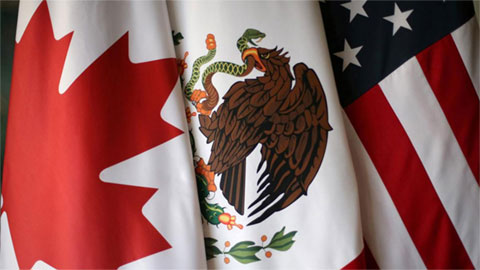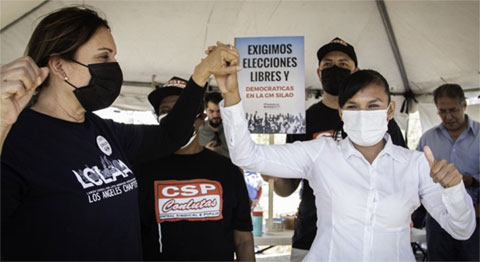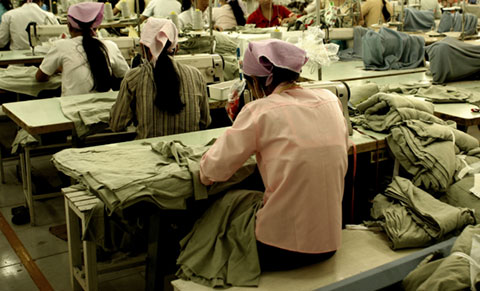
Trade Agreements

The Office of the United States Trade Representative (USTR) has overarching responsibility for U.S. trade policy. USTR leads the Trade Policy Staff Committee process, which provides interagency advice and guidance on trade policy and administration. The Office of Trade and Labor Affairs (OTLA) within the Bureau of International Labor Affairs (ILAB) is responsible for overseeing the labor provisions in U.S. Free Trade Agreements (FTAs) on behalf of the U.S. Department of Labor.
ILAB's role is to ensure that U.S. trade agreements respect workers’ rights and that American workers can compete on a level playing field. Labor provisions in FTAs establish official processes for receiving complaints (“submissions”) from interested individuals and organizations that believe a trading partner is not fulfilling its labor commitments. The U.S. government leverages these FTAs as an incentive to comply with fair labor laws when companies want to do business with the U.S. FTAs also provide relevant frameworks for cooperative action to support labor rights. Labor commitments in FTAs have grown and evolved substantially over time, increasingly leveraging FTAs as a core vehicle to improve labor rights.
Free Trade Agreement Enforcement for FTAs with labor provisions: FTA submission process
- Jordan Free Trade Agreement (JOFTA)
- Chile Free Trade Agreement (CLFTA)
- Singapore Free Trade Agreement (SGFTA)
- Australia Free Trade Agreement (AUFTA)
- Oman Free Trade Agreement (OMFTA)
- Central America-Dominican Republic Free Trade Agreement (CAFTA-DR)
- Bahrain Free Trade Agreement (BHFTA)
- Morocco Free Trade Agreement (MAFTA)
- Peru Trade Promotion Agreement (PTPA)
- Korea Free Trade Agreement (KORUS)
- Colombia Trade Promotion Agreement (COTPA)
- Panama Trade Promotion Agreement (PETPA)
United States-Mexico-Canada Agreement Enforcement

The United States-Mexico-Canada Agreement (USMCA) has the strongest and most far-reaching labor provisions of any U.S. free trade agreement. The agreement contains a chapter that prioritizes labor obligations by including them in the core of the agreement and making them fully enforceable.
- U.S.-Mexico-Canada Agreement (USMCA)
o Text of Chapter 23 of USMCA’s labor chapter and labor chapter submissions: 23-Labor.pdf (ustr.gov)
Other U.S. Trade Agreements
Preference Programs

Preference programs are unilateral trade benefits that the U.S. government provides to developing countries to promote economic growth and reduce the costs of goods, such as manufacturing inputs, in the U.S. market. Access to preference program privileges is contingent on various eligibility requirements, including criteria that countries protect and make progress on workers’ rights.
ILAB's annual Findings on the Worst Forms of Child Labor report, as mandated by the Trade and Development Act of 2000, evaluates Generalized System of Preferences beneficiaries’ performance on meeting specific labor requirements in relation to child labor. The worker rights section of the U.S. State Department’s annual Country Reports on Human Rights Practices also is considered in preference program decisions.
- Generalized System of Preferences (GSP) [Inactive pending Congressional re-authorization. In the past, GSP has included labor.]
- African Growth and Opportunity Act (AGOA)
- Caribbean Basin Trade Partnership Act (CBTPA)
- Haitian Hemispheric Opportunity through Partnership for Encouragement Act of 2008 (HOPE II)
- Nepal Trade Preference Program (NTPP)
Enforcement Mechanisms

Enforcement under USMCA
There are two types of petitions related to labor rights under the USMCA: the Rapid Response Petition and the Chapter 23 Petition Mechanism.
- FAQs: Frequently Asked Questions (FAQs) on ways to raise United States-Mexico-Canada Agreement (USMCA) Labor Issues with the U.S. government – (A) Web-Based Hotline; and (B) Petitions: Rapid Response Mechanism Petitions, and Labor Chapter Petitions
- Rapid Response Mechanism (RRM) - Rapid Response Petition
The first type of petition is referred to as the Rapid Response Petition. It alleges that workers at a specific workplace are being denied their rights of freedom of association and collective bargaining (the right to, for example, organize a union, join a union, campaign for a union, or approve or reject a collective bargaining agreement) under the relevant Party’s domestic laws. This type of petition is limited to certain workplaces in specific industries and the enforcement mechanism is the Rapid Response Labor Mechanism in the USMCA Dispute Settlement Chapter (Facility-Specific Rapid Response Labor Mechanism). - Chapter 23 Petition Mechanism – Labor Chapter Petition
The Labor Chapter Petition is a mechanism that facilitates a process to allege that either the government of Mexico or Canada is failing to comply with its labor obligations under the USMCA Labor Chapter (Chapter 23). Under the USMCA, any “person” of the United States, Mexico, or Canada may submit a petition, including individuals, labor organizations, companies, and non-governmental organizations, to the Interagency Labor Committee for Monitoring and Enforcement of the U.S. government. A petition is a written statement requesting a formal review of a labor-related matter.
USMCA Resources

- 31-Dispute-Settlement.pdf (ustr.gov)
Text for RRM from USMCA agreement - Federal Register: Notice of Interagency Labor Committee for Monitoring and Enforcement Final Procedural Guidelines for Petitions Pursuant to the USMCA
Procedural Guidelines published in the Federal Register on how to submit an RRM or Ch. 23 petition. - USMCA Web-Based Hotline
The Web-Based Hotline for Labor Issues in USMCA Countries is a confidential web-based tip hotline to receive information regarding labor issues in Canada and Mexico. U.S. government labor experts carefully review all tips submitted through the hotline. In providing contact information when submitting a tip, an expert may follow up to learn more about the situation reported by the submitter. The hotline should be used for reporting information about labor issues occurring in Mexico and Canada. The committee is particularly interested in the following issues: freedom of association and collective bargaining (rights related to forming and joining unions, and negotiating collectively), forced labor, child labor, employment discrimination, minimum wages, hours of work, and occupational safety and health.
U.S. Government Procurement-related Mechanisms and Commitments

As the world's largest purchaser of goods and services, the U.S. government implements several procurement-related requirements related to labor conditions.
- Procurement requirements in the Federal Acquisition Regulation (FAR) Subpart 22.15 related to forced and child labor (https://sftool.gov/plan/545/responsible-business-conduct) sets forth regulatory guidance for identifying products that the Department of Labor, Treasury, and State have a reasonable basis to believe might have been mined, produced, or manufactured by forced or indentured child labor.
- ILAB publishes the List of Products Produced by Forced or Indentured Child Labor pursuant to Executive Order 13126. This list is intended to ensure that U.S. federal agencies do not procure goods made by forced or indentured child labor. Under procurement regulations, federal contractors who supply products on the List must certify that they have made a good faith effort to determine whether forced or indentured child labor was used to produce the items supplied.
- FAR Subpart 22.17 related to combatting trafficking in persons (https://www.acquisition.gov/far/subpart-22.17) implements the United States government policy prohibiting trafficking in persons in federal contracting, by prohibiting federal contractors and subcontractors from engaging in trafficking in persons, using forced labor, withholding employee identity or immigration documents, and engaging in unlawful recruitment practices, including charging recruitment fees to employees or potential employees.
- As part of the proposed Indo-Pacific Economic Framework for Prosperity’s Pillar IV on Fair Economy, the U.S. government is committed to promoting transparency and integrity in government procurement practices, as laid out in a joint statement on November 16, 2023, through measures such as addressing gaps in legal and operational frameworks to prevent money laundering and meeting the standards set out in Financial Action Task Force recommendations, as well as adopting or maintaining criminal, civil, or administrative measures to address corruption, fraud, and other illegal acts in government procurement among others: IPEF Pillar IV Ministerial Statement; Pillar IV – Fair Economy Joint Statement.
Mediation Mechanisms

OECD’s Due Diligence Guidance for Responsible Business Conduct provides practical support to companies on the implementation of due diligence recommendations. This guidance provides recommendations to help companies avoid and address issues related to labor rights, human rights, the environment, bribery, consumers, and corporate governance that may be associated with their operations, supply chains, and other business relationships.
- OECD Due Diligence Guidance for Responsible Business Conduct
- National Contact Points for Responsible Business Conduct
National Contact Points for Responsible Business Conduct (NCPs for RBC) are government-established agencies. Their mandate is to promote OECD Guidelines for Multinational Enterprises, and related due diligence guidance, and to handle cases (referred to as “specific instances”) as a non-judicial grievance mechanism. To date, 51 governments, including the United States, have an NCP for RBC.
- National Contact Points for Responsible Business Conduct
Import and Export Enforcement Mechanisms

Import
- Section 307 of the Tariff Act of 1930, WROs and Findings
U.S. Customs and Border Protection (CBP) implements Section 307 of the Tariff Act of 1930 (19 U.S.C. 1307) through issuance of Withhold Release Orders (WRO) and findings to prevent the importation of any product that was mined, produced, or manufactured wholly or in part using forced labor. CBP is responsible for preventing the entry of products made with forced labor into the U.S. market by investigating and acting upon allegations of forced labor in supply chains. - Allegations of forced labor should be submitted via CBP’s eAllegations website. Please reference the Allegation Submission Checklist and Recommended Guidelines for Supporting Documentation when submitting forced labor allegations.
- Forced Labor Enforcement Task Force
 The Forced Labor Enforcement Task Force (FLETF) was established pursuant to section 741 of the USMCA Implementation Act and Executive Order 13923 to monitor the enforcement of the prohibition on importing goods made wholly or in part with forced labor into the United States.
The Forced Labor Enforcement Task Force (FLETF) was established pursuant to section 741 of the USMCA Implementation Act and Executive Order 13923 to monitor the enforcement of the prohibition on importing goods made wholly or in part with forced labor into the United States. - UFLPA
The Uyghur Forced Labor Prevention Act (Public Law No. 117-78), also known as the UFLPA, establishes a rebuttable presumption that goods mined, produced, or manufactured wholly or in part in Xinjiang or by an entity on the UFLPA Entity List are prohibited from U.S. importation under 19 U.S.C. § 1307. Under the UFLPA, the FLETF was further tasked to develop a strategy for supporting the enforcement of Section 307 of the Tariff Act of 1930, as amended (19 U.S.C. § 1307) to prevent the importation into the United States of goods mined, produced, or manufactured wholly or in part with forced labor in the People’s Republic of China. - Countering America's Adversaries Through Sanctions Act (Public Law 115-44) (CAATSA)
CAATSA Section 321(b) (22 U.S.C. § 9241a) created a rebuttable presumption that significant goods, wares, merchandise, and articles mined, produced, or manufactured wholly or in part by North Korean nationals or North Korean citizens anywhere in the world are forced-labor goods prohibited from importation under the Tariff Act of 1930 (19 U.S.C. 1307). - Civil Penalties
CBP Trade enforces laws by targeting and penalizing lawbreakers through monetary penalties and legal action.
Export

- Entity List
Although predominantly focused on security and competitive concerns, the Export Administration Regulations (EAR) contain a list of names of certain foreign persons – including businesses, research institutions, government and private organizations, individuals, and other types of legal persons – that are subject to specific license requirements for the export, reexport and/or transfer (in-country) of specified items. These persons comprise the Entity List, which is found in Supplement No. 4 to Part 744 of the EAR. On an individual basis, the persons on the Entity List are subject to licensing requirements and policies supplemental to those found elsewhere in the EAR.
Business Advisories

The U.S. government, through a combination of various departments and agencies as signatories, has released and subsequently updated several business advisories. These advisories to highlight that businesses and individuals with potential exposure to, or involvement in, operations or supply chains tied to various regimes or in specific geographies or sectors that do not conduct appropriate due diligence run the risk of engaging in conduct that may expose them to significant reputational, financial, and legal risks, including violations of U.S. anti-money laundering laws and sanctions, as well as abetting human rights abuses.
